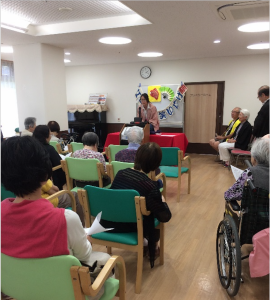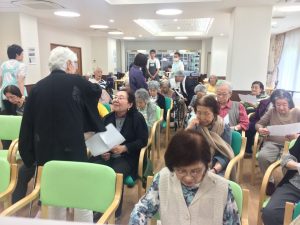For one month I volunteered at the volunteer comedy group called Mitaka-shi Edo Kobanashi in Tokyo, Japan. Volunteers would travel all over the town of Mitaka-shi and perform a traditional storytelling style called Edo kobanashi to both children and adults alike. This involves one person taking on various roles throughout the story by emulating different voices and acting out their lines, ultimately ending the story with a humorous plot twist or clever pun.

[Me performing kobanashi at a nursing home. For kobanashi, we sit on an elevated stage (an improvised table, in this case), and perform clever stories in front of our audience.]
Volunteers generally select their favorite kobanashi (there are over 1,000 of them!), and memorize it verbatim to perform for the audience. It requires extremely expressive acting, voice modulation, and a great sense of comedic timing to transform the written dialogue into a captivating performance. We also interact with our audience by reading kobanashi together, and some call-and-response activities.

[Volunteers holding microphones walk through the audience to pick a member to read kobanashi (printed out and distributed beforehand) with them]
By volunteering, I had the wonderful opportunity to closely interact with the locals of Tokyo in a way that simply studying abroad would not have enabled me to accomplish. From small schoolchildren to the elderly, I was able to converse with locals and slowly learn more about what life is like in Japan—for example, most of our volunteering sites were nursing homes, thus reflecting Japan’s rapidly aging population. After performances, our group would often grab a meal together, learning more about each other and exploring more of Tokyo. I especially became close with my peers in my volunteering group, often discussing experiences in America and Japan and the role of kobanashi in contemporary Japanese society for the research on kobanashi’s history and structure that I was conducting at the same time. Their motivations for performing kobanashi were varied, but the most common reason why people join this volunteering group is to spread laughter through their community, a motivation I found to be deeply inspiring.
It was also interesting to be in a completely Japanese environment instead of spending my time at the international university where I studied abroad in the fall. In addition to not being able to fall back to English when I couldn’t remember a Japanese word, the cultural barrier and generation gap also served as challenging obstacles in communicating myself clearly. I found it to be more exciting than daunting, however, and I threw myself into the volunteering group with great enthusiasm.
Overall, my peer volunteers, our audience, and the inspiring group leader who invited me into this group are all amazing people who greatly influenced the way I view Japanese culture now, as well as the almost-magical power of laughter through kobanashi. I greatly appreciate this opportunity given to me by the CCE offices, and I would not hesitate to do it again.
